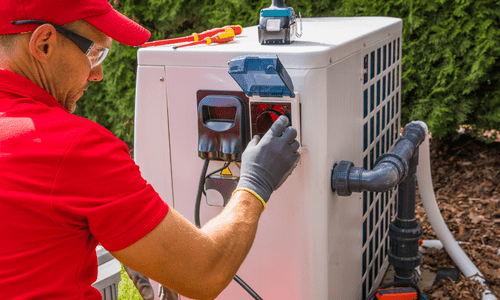While the atmospheric temperature in any part of the world keeps changing throughout the year, it remains the same, approximately 10 feet beneath the ground. So whether it’s chilly cold or scorching hot on the outside, the temperature at a certain depth under the ground will always remain constant.
In the heating industry, a device called a geothermal heat pump has been decided to leverage this energy to maintain the temperature inside your house.
This article will teach you what a geothermal heat pump is and how it cools or warms your house. So, make sure you scroll down to the end to comprehend if investing in a geothermal heat pump is worth it.
What is a geothermal heat pump?

A Geothermal heat pump is an engineered system that uses the earth as a giant natural energy source. They use ground-source heat pumps to transmit heat from the ground into a building’s heating system to warm it or from the building or home into the ground to cool it.
A geothermal heating system is an excellent option for homeowners. Although the installation costs can be a bit higher than traditional cooling and heating systems, the energy savings can more than make up for the initial investment in the long run.
Geothermal heat pumps are an excellent way to heat and cool your home energy-efficient and cost-effectively. Using the ground’s natural resources, geothermal heat pumps are much more efficient than traditional air conditioning and heating systems. Not just that, they can help reduce your monthly electricity bills.
How does a geothermal heat pump work?
A geothermal heat pump extracts and circulates energy from naturally occurring groundwater that flows through your property’s underground geological formation.
Geothermal heat pump either uses a fluid or naturally occurring water in the system. A combination of water and antifreeze is also present in the system to ensure that the system can withstand the freezing and thawing temperatures of winter and summer.
The geothermal heat pump employs a pump to move liquid via a series of pipes. The pipes travel from the heat exchanger within your home to just beneath the earth, where the temperature remains constant all year. When fluid travels through these pipes, it transports heat from beneath the earth to the heat exchanger. The heat exchanger subsequently transmits the same heat to warm up your residence during the winter.
The entire process reverses on the summer days. During summers, the heat pump collects the heat from inside your house and dumps it into the ground.
Geothermal heat pumps and their types
Geothermal heat pumps, based on their functionality, are bifurcated into two main types.
Closed-loop systems
This system uses a closed loop of underground pipes to transfer heat. The loop can be arranged in a vertical or horizontal configuration depending on the site conditions.
Closed-loop geothermal heat pumps are further bifurcated into the following two types.
- Horizontal loop systems: Horizontal loop systems are most commonly used for residential applications. They are installed in trenches dug approximately six feet below the earth’s surface. Pipes filled with water or a glycol solution are looped through them. The pipes absorb heat from the earth in the winter, and in the summer, they transfer it back into the ground.
- Vertical loop systems: Vertical loop systems are typically used for commercial applications but can also be used in residential applications if limited space is available. A vertical loop consists of pipes drilled down into the earth, usually to depths of between 100 and 400 feet, depending on the climate. These pipes carry a water-glycol mixture, allowing the heat pump to exchange heat with the earth.
Open-loop systems
An open loop system uses underground water sources, such as wells or lakes, to transfer the heat. Instead of passing the liquid through a network of pipes like a closed-loop system, an open-loop system pumps the water from the source. The water is then used for heating or cooling the house and then returned to the source.
Benefits of geothermal heat pumps
Geothermal heat pumps have many benefits over traditional heating and cooling methods. Some of those benefits include.
- Geothermal heat pumps are more effective than having separate systems for heating and cooling.
- Compared to other systems, geothermal heat pumps are extremely energy efficient and can save you thousands of dollars on energy bills over the system’s life.
- Geothermal systems do not produce greenhouse gases, making them an environmentally friendly option.
- These pumps provide consistent indoor temperatures, improving overall comfort.
- The underground loop system has a 25-50 years lifespan, while the indoor unit typically lasts 10-15 years, making geothermal systems a long-term investment.
- The maintenance for a geothermal heat pump is minimal compared to traditional systems.
- Installing a geothermal heat pump can increase the value of your home.
- Unlike outdoor units of traditional systems, geothermal heat pumps have no outdoor components, leading to quieter operation.
Are geothermal heat pumps worth it?

There are several factors that you need to consider before deciding on the worthiness of a geothermal heat pump. Here are some of the major factors to check whether a geothermal heating pump is worth it or not for your home:
Initial cost
A geothermal heat pump system’s installation cost is often higher than traditional heating and cooling systems. However, the increased efficiency of a geothermal system can result in significant long-term savings on energy bills.
Climate
The effectiveness of a geothermal heat pump is dependent on the climate. In regions with severe winters, a geothermal system may provide significant cost savings, while in milder climates, the cost savings may be lower.
Building type and size
The size and type of building can also impact the cost-effectiveness of a geothermal heat pump. Larger buildings or those with complex heating and cooling needs may require more extensive ground loops and, therefore, higher initial costs.
Maintenance and repair costs
Geothermal heat pumps have fewer moving parts and no outdoor components, leading to reduced maintenance requirements. It can result in lower long-term repair and maintenance costs compared to traditional systems.
Get a geothermal heat pump installed in no time
Overall, geothermal heat pumps can be an excellent energy saver and reduce your impact on the environment. Besides, it is a great long-term investment that also increases the value of your house. While a geothermal heat pump can offer extended benefits, it is subject to proper installation.
Therefore, it becomes essential to hire HVAC experts like River Valley to get the job done. So, whether you are planning to install a new geothermal heat pump or repair an existing one, make sure to give professionals at River Valley a call!
